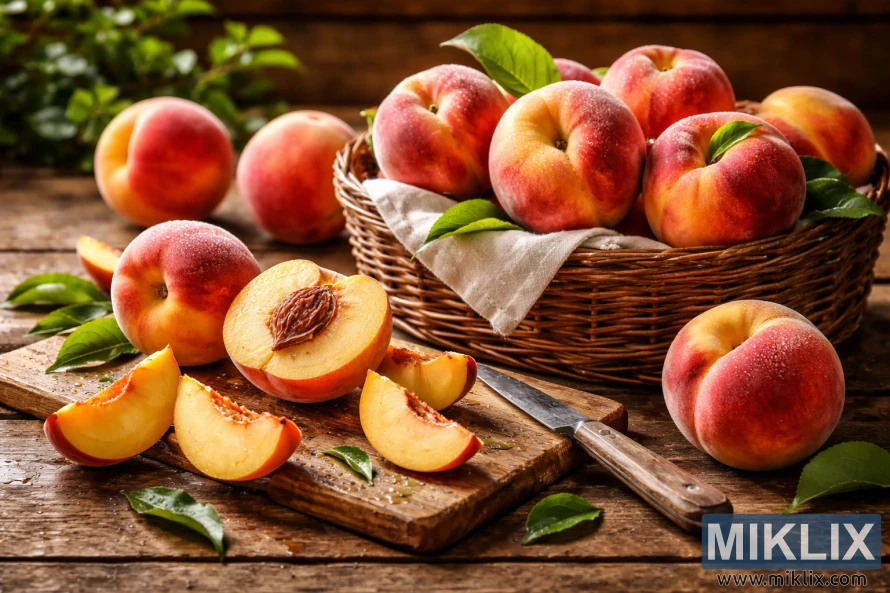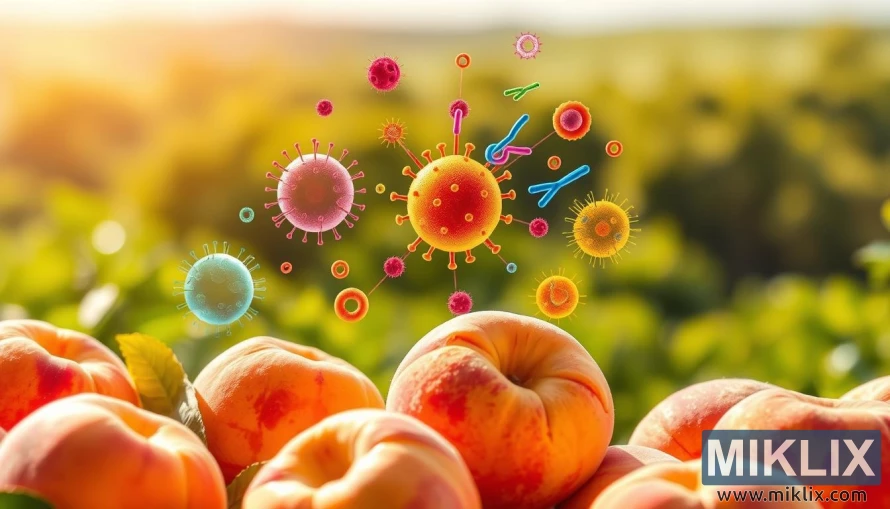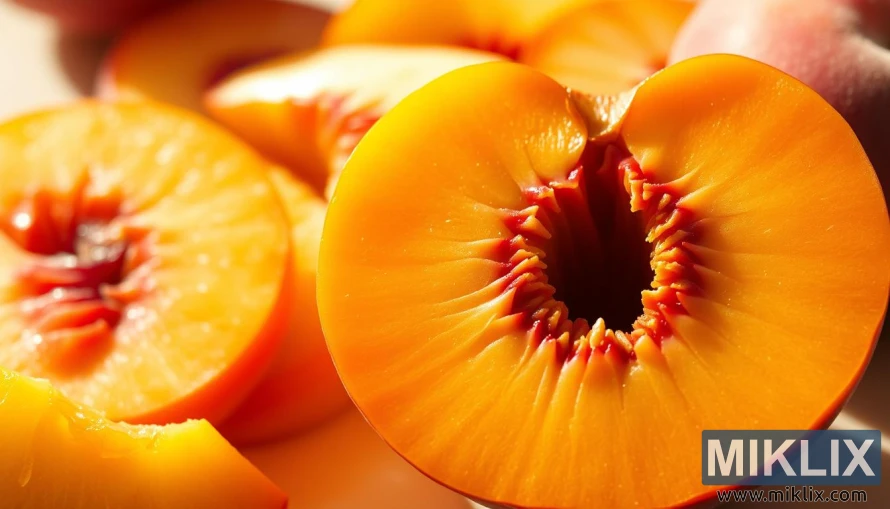Peach Perfect: The Sweet Path to Better Health
Published: May 16, 2025 at 12:17:05 PM UTC
Last updated: December 24, 2025 at 2:47:17 PM UTC
Peaches, known scientifically as Prunus persica, have been enjoyed for over 8,000 years. They come from China and are loved for their sweet taste and juicy feel. But peaches are more than just tasty; they're packed with health benefits. This article will explore the nutritional value of peaches. It will show how they boost your overall health. Peaches are full of vitamins and antioxidants. They may even help prevent chronic diseases.

Key Takeaways
- Peaches offer numerous health benefits and are a delicious way to support wellness.
- Rich in vitamins and antioxidants, peaches help improve overall health.
- Incorporating peaches into your diet can enhance digestion and heart health.
- Peaches contain properties that may protect the skin and assist in allergy relief.
- Exploring fresh peaches and their versatility in cooking can elevate your meals.
Introduction to Peaches
Peaches are delightful fruits that belong to the stone fruit family. This family includes plums, apricots, and cherries. They are a favorite among fruit lovers for their flavor and variety.
The peach origin dates back thousands of years to China. There, they hold cultural significance. Peaches are known for their fuzzy skin and sweet, juicy flesh. They have a pit in the center.
There are several peach varieties, including yellow and white kinds. Each offers a unique taste and texture. Peaches are not only delicious but also packed with nutrients.
They are versatile and can be enjoyed in many ways. You can eat them fresh, bake them, or blend them into smoothies. Their versatility makes them a great choice for many dishes.
Packed With Nutrients and Antioxidants
Peaches are a treasure trove of nutrients and health-boosting compounds. They are packed with vitamins A, C, E, and K. These vitamins are key to keeping us healthy. A medium peach has about 58 calories and 2 grams of fiber, making it a tasty and filling snack.
Peaches are also low in calories but high in minerals like potassium, copper, and manganese. These minerals help keep our blood pressure in check and support strong bones.
What really sets peaches apart is their antioxidants. These powerful compounds fight off oxidative stress and protect us from free radicals. Studies show that fresh peach juice keeps its antioxidant power for a while after we drink it. This makes peaches a great way to increase your antioxidant levels.
May Aid Digestion
Peaches are great for your digestion. A medium peach has about 2 grams of fiber. This fiber is key for a healthy gut.
The fiber in peaches helps you go to the bathroom regularly. It also makes your gut happy and healthy.
Studies say peach flowers have special compounds. These compounds help your gut move food better. So, peaches are good for your stomach, even if you have digestive problems.
Eating peaches often can make your digestion better. They're a tasty way to keep your gut healthy.
Heart Health Benefits of Eating Peaches
Eating peaches can be good for your heart. They are full of potassium, which helps control blood pressure. Keeping potassium levels right can lower the chance of high blood pressure, a big risk for heart disease.
Studies show peaches might help with cholesterol too. Some parts of peaches can help remove bile acids, which can lower cholesterol. This could help keep your heart healthy.
More research is needed to be sure about these benefits in people. But, eating peaches might help your heart and taste great too.

May Protect Your Skin
Peaches are good for your skin because they are full of vitamins and antioxidants. Vitamin C in peaches helps make collagen, which makes your skin elastic and hydrated. Antioxidants in peach extracts fight off free radicals, preventing early aging and damage from the sun.
Research shows that peach extracts can help keep your skin moist, making it look smoother and brighter. This is great for anyone wanting better skin texture. Peach extracts might also protect your skin from UV damage, adding extra defense against the environment.
Eating peaches can be fun and good for your skin. The natural ingredients in peaches could be a big help in skincare in the future.
Potential Role in Cancer Prevention
Peaches are not just tasty; they might also help prevent cancer. They are full of carotenoids and polyphenols, which could fight cancer. Studies show that peach compounds can slow down cancer cell growth and might even stop it from spreading.
Research points to peaches helping lower breast cancer risk, mainly in women after menopause. The antioxidants in peaches are key. They help protect cells from damage and inflammation.
Even though the results are encouraging, more human studies are needed. Eating peaches regularly could be a tasty way to boost your health and well-being.
May Reduce Allergy Symptoms
Many people deal with allergies that make everyday life tough. Early studies show peaches might help with these issues. Eating peaches could help control histamine, which often leads to sneezing and itching.
Peach extracts might also fight inflammation from allergies. This could ease the discomfort of seasonal allergies or food sensitivities. While more research is needed, adding peaches to your meals could be a tasty way to fight allergies.
Additional Health Benefits of Peaches
Peaches are not just tasty; they're also packed with health benefits. They can boost your immunity thanks to vitamins A and C. These vitamins help your body fight off sicknesses more effectively.
Peaches also help with detoxification. Their natural fibers and antioxidants help remove harmful toxins from your body. This can make you feel more energetic and refreshed.
Another great benefit of peaches is their ability to regulate blood sugar. Studies suggest that peaches may help manage insulin resistance and keep blood sugar levels stable. This is important for people with diabetes or those at risk of it.

Peaches: A Versatile Ingredient
Peaches are loved by both home cooks and chefs. They can be enjoyed in many ways, making them key in many recipes. Their sweet and tangy taste adds flavor to any dish, whether it's a dessert or a savory meal.
Exploring the culinary uses of peaches opens up new possibilities. Try grilling them for a smoky flavor, adding them to salads for sweetness, or baking them into pies. Their juicy texture is great for smoothies, yogurt, or salsas.
- Grilled peaches complement savory meats.
- Peach salsa adds zest to fish tacos.
- Peach cobbler exemplifies comfort food.
- Fresh peach slices elevate salads.
Discovering the versatility of peaches lets you try new flavors and dishes. Start experimenting with these delicious fruits to expand your cooking skills.
How to Select and Store Peaches
Choosing the right peaches is key to enjoying their best taste and texture. Look for peaches with a sweet aroma. This is a sign of their ripeness. Also, pick fruits that are firm but slightly soft when pressed.
Stay away from peaches with bruises or wrinkles. These are likely overripe and not good to eat.
Proper storage is also important for keeping peaches fresh. If your peaches are not ripe, let them sit at room temperature. This helps them ripen evenly. Once ripe, put them in the fridge to keep them fresh longer.
If you need to store peaches for a while, freezing is a good option. Slice the peaches and add lemon juice to prevent browning. Then, freeze them.
Seasonality and Availability of Peaches
The peach season in the United States peaks between June and August. This time brings a burst of delicious, juicy peaches. It's also when to buy peaches for the best taste. During these months, you can find fresh peaches at local markets and farms.
Outside of this peak time, you can find peaches in frozen and canned forms. These preserved peaches keep their nutritional value. So, you can enjoy peaches all year, whether fresh in summer or canned in winter.
Comparison: Fresh vs. Canned Peaches
Both fresh and canned peaches are tasty choices. Each has its own benefits and nutritional differences. These can help you decide what to eat.
Fresh peaches are full of nutrients. They have more antioxidants, which are good for your health. Eating the skin adds even more benefits.
Canned peaches are easy to use and last longer. But, some have added sugars. Always check the label for natural juice to avoid extra sugar.
- Nutritional benefits of fresh peaches:Higher antioxidant levels
- Rich in vitamins and minerals
- No added sugars
- Nutritional characteristics of canned peaches:May contain added sugars
- Less fiber than fresh options
- Convenient and ready-to-eat

How to Prepare Peaches for Consumption
Preparing peaches can make them taste better and be more enjoyable. First, rinse the peaches under cold water to get rid of dirt. This step is key to making sure the peaches are clean and ready to eat.
To peel peaches, blanch them in boiling water for 30 to 60 seconds. Then, put them in an ice bath. This makes the skin easy to remove.
After preparing, you can enjoy peaches in many ways. You can eat them raw, use them in baking, or try out new peach recipes. Remember, ripe peaches taste and feel the best.
Peaches in Different Cuisines
Peaches are loved by many cultures around the world. They are used in both sweet and savory dishes. This makes peaches a favorite in many recipes.
In the Southern United States, peach cobbler is a classic dessert. In the Mediterranean, peaches are used in salads to balance flavors. Asian dishes often feature peaches in stir-fries or drinks.
Peaches are not just for desserts. Try grilled chicken with peach salsa for a cool summer dish. Peaches also add flavor to smoothies, making them a great breakfast or post-workout snack.
Peaches can be enjoyed in many ways, from fresh to grilled. They add excitement to any meal. This makes them a key ingredient in kitchens everywhere.
Possible Risks and Considerations When Eating Peaches
Peaches are a favorite fruit for many, but they can cause problems for some. People allergic to cherries or plums might also react to peaches. Symptoms like itching or swelling in the mouth and throat can happen soon after eating them.
Knowing the risks of peaches is key, mainly for those with allergies. If you think you might be allergic, talk to a doctor before eating peaches. Taking precautions can make eating peaches safer and more fun.
Conclusion
Peaches are not just tasty; they're also packed with health benefits. They help with digestion, support heart health, and protect your skin. Adding peaches to your meals can make them more flavorful and improve your health.
The health perks of peaches, like fighting cancer, make them a must-have in your kitchen. Their sweet taste can make any dish, from salads to desserts, more enjoyable. This makes healthy eating a pleasure.
In short, peaches are key to a balanced diet. Eating them can lead to better health and a healthier lifestyle. So, enjoying peaches is a tasty way to live a healthier life.

Further Reading
If you enjoyed this post, you may also like these suggestions:
- From Salad Dressing to Daily Dose: Surprising Benefits of Apple Cider Vinegar Supplements
- The Green Hydration Machine: How Cucumbers Boost Your Wellbeing
- Guava Gains: How One Fruit Can Transform Your Health
